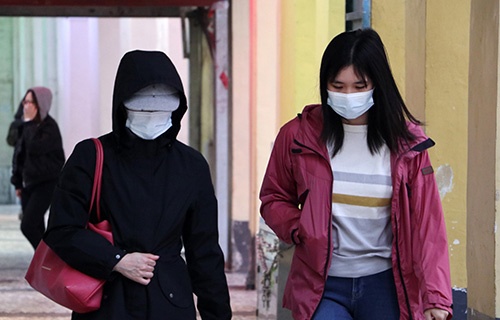La OMS no recomienda las mascarillas faciales en general a las personas sanas. Sin embargo, los CDC ahora han establecido una nueva directriz y dicen que "las personas deben usar máscaras de tela cuando salen". Nueva evidencia sugiere que el uso de mascarillas quirúrgicas podría prevenir la propagación de coronavirus humanos y virus de influenza de individuos sintomáticos.
COVID-19 virus está presente en el aliento exhalado y la tos de personas infectadas y se propaga a través de gotitas en el aire de personas que tosen y estornudan.
Ha habido un debate sobre la eficacia de máscaras faciales in reducing spread of the virus. The international body WHO doesn’t recommend them generally to the healthy people. However, CDC has now laid down new guideline and say ”people should wear cloth masks when they go outside”.
In the brief communication published in Nature Medicine on 03 April 2020, the researchers found that the usage of surgical face masks could prevent spread of human coronaviruses and influenza virus from symptomatic individuals.
Salud respiratoria virus infections spread between human beings through contact, respiratory droplets and fine-particle aerosols. However, there are uncertainties around modes of transmission of COVID-19.
In this study, the researchers quantified the amount of virus in exhaled breath of participants and determined the potential efficacy of surgical face masks in preventing the transmission. Of 3,363 screened individuals, 246 individuals provided exhaled breath samples The 50% participants were randomized to ‘not wearing a face mask’ during the exhaled breath collection and the rest were randomized to ‘wearing a face mask’. They tested viral shedding in nasal swabs, throat swabs, respiratory droplet samples and aerosol samples and compared the latter two between samples collected with or without a face mask.
They found viral shedding to be higher in nasal swabs than in throat swabs. Further, they detected coronavirus in 30-40% samples collected from participants without face masks but no virus was detected in droplets and aerosols collected from patients wearing face masks.
This study demonstrated the efficacy of surgical masks in reducing coronavirus detection and viral copies in respiratory droplets and in aerosols suggesting that the surgical face masks could be used by ill people to reduce onward transmission of the virus.
***
Referencia:
Leung, N.H.L., Chu, D.K.W., Shiu, E.Y.C. et al. Respiratory virus shedding in exhaled breath and efficacy of face masks. Published on 03 April 2020. Nature Medicine (2020). DOI: https://doi.org/10.1038/s41591-020-0843-2






































